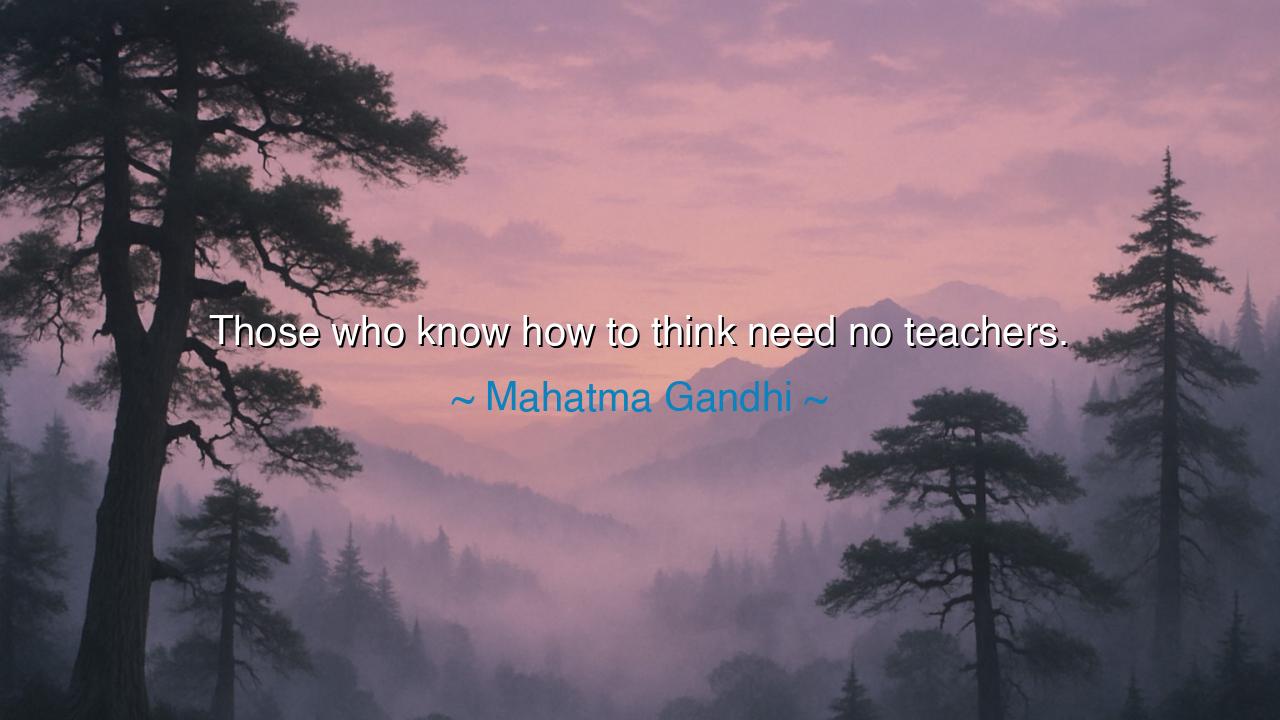
Those who know how to think need no teachers.






Hear the piercing words of Mahatma Gandhi: “Those who know how to think need no teachers.” At first glance, these words seem to dismiss the noble role of instruction, but in truth, they reveal a deeper wisdom about the power of the awakened mind. For Gandhi does not deny the value of the teacher; rather, he honors the greater gift — the ability to think, to reason, to discern truth without dependency on another. Once a man or woman learns to guide the mind with clarity and honesty, all of life becomes the classroom, and all of existence becomes the instructor.
The ancients knew this truth. Socrates, who never wrote down his own thoughts, spent his days stirring the minds of Athenians not by giving them answers, but by teaching them how to think. He believed that truth already lived within the soul, and the task of philosophy was simply to bring it forth, like a midwife bringing life into the world. Likewise, the Buddha declared that his followers should not cling even to his words, but test all teachings against their own reason and experience. Gandhi stands in this lineage, reminding us that the ultimate teacher is the awakened mind itself.
To know how to think is to be free. Those who cannot think are bound by superstition, enslaved by authority, and easily led astray. But the thinker, the one who questions, reflects, and seeks the truth, cannot be chained. History is filled with examples. Consider Galileo, who dared to look through his telescope and challenge the decrees of his age. Had he relied only on the teachers of his time, he would have accepted the falsehood that the heavens revolved around the earth. But by the power of thinking, he pierced the veil of error and revealed the vastness of the cosmos.
And yet, Gandhi’s words are not a rejection of the teacher but a reminder of their highest purpose. The true teacher does not create dependency, but awakens independence. The false teacher says, “Follow me blindly.” The true one says, “Learn how to see for yourself.” In this sense, even the greatest of guides must eventually step aside, for the student who has learned to think carries within themselves the only companion they will ever truly need.
This truth also points us toward responsibility. For to know how to think is not merely to solve problems or win arguments, but to search earnestly for what is good, just, and right. Gandhi himself exemplified this. When faced with the oppression of empire, he did not accept the teachings of violence or submission. Instead, by thinking deeply, by returning again and again to the principles of truth (satya) and nonviolence (ahimsa), he forged a new path that confounded the mighty and uplifted the lowly. His revolution was born not in the battlefield, but in the clarity of thought.
The lesson for us is clear: cultivate the power of the mind. Do not be content merely to repeat what others say, nor to depend forever on external guides. Seek the ability to reason, to question, to weigh truth against falsehood, and to stand by what conscience reveals. The world is full of voices, some wise, some deceptive; only the mind that knows how to think can tell the difference.
Practical action lies before us: read widely, but never slavishly. Ask questions of every idea, even those you cherish. Practice silence and reflection, so that your own thoughts may speak clearly. And above all, test all teachings against the light of compassion and truth. In this way, you honor not only Gandhi’s wisdom but the wisdom of all the ages — that the greatest treasure is not the voice of the teacher, but the awakened power of the thinking soul.
Thus, let Gandhi’s words echo in your spirit: “Those who know how to think need no teachers.” For when you have mastered the art of thought, the universe itself becomes your guide, every moment your lesson, and truth your eternal companion.






AAdministratorAdministrator
Welcome, honored guests. Please leave a comment, we will respond soon